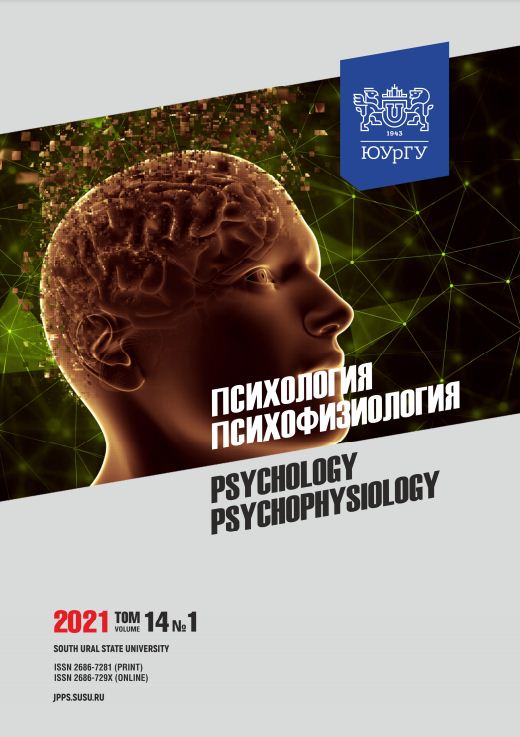LIFE PURPOSE ORIENTATIONS, COPING STRATEGIES AND SATISFACTION WITH LIFE IN STUDENTS AS A PROBLEM OF PERSONALITY PSYCHOLOGY
Abstract
Abstract. The study was conducted just before the SARS-COV-2 pandemic in our country. The work defines the level of mindfulness, satisfaction with life, and happiness in university students. Life purpose orientations and coping strategies of students with high and low levels of satisfaction with life are shown. Aim. The paper aims to determine the features of life purpose orientations, coping strategies and satisfaction with life in the students of a transport university. Materials and methods. 66 university students were examined, the average age was 19.9 years, 26 males and 37 females. The following methods were used: “Purpose-in-Life Orientations” (SZHO) by D. Leontiev; Coping test by R. Lazarus; Life Satisfaction by E. Diner; Oxford Happiness Questionnaire by M. Argyle. Results for interpretation were obtained by conducting Student's t-test and Pearson correlation analysis using the SPSS v. 22.0 statistical program package. Results. University students have an average level of mindfulness, satisfaction with life, happiness, which characterizes the living and learning environment as environmentally sound and safe. Significant differences were found between life purpose orientations, coping strategies and happiness, as well as differences between students with high and low levels of life satisfaction. Discussion. The largest number of correlations in both groups was found between life purpose orientations and life satisfaction. In students with a low level of life satisfaction, the result of life is associated with coping planning, in students with a high level – with the search for social support, which, in our opinion, is a source of personal potential, personal development and quality of life. Conclusion. Differences and relationships between life purpose orientations, coping strategies and happiness among transport university students with a high and low level of life satisfaction are determined.
Downloads
References
2. Fomenkov A.I. Transformation of life orientations of students in the context of the formation of their future sociologists competencies. Sotsialnye transformatsii = Social transformations. 2016; 26: 122–131. (in Russ.) https://www.elibrary.ru/item.asp?id=27657103
3. Vostroknutova T.F., Vostroknutov S.I., Erofeeva N.Y. Life-purpose orientations of students of different physical education specializations. Teoriya i praktika fizicheskoi kultury = Theory and Practice of Physical Culture. 2017; 1: 11. (in Russ.). https://www.elibrary.ru/item.asp?id=28370437
4. Gabdulina L.I., Fedorova O.I. Self-organization of activity of students in relation to their values and life guiding orientations. Psikhologiya obucheniya = Psychology of learning. 2017; 1: 36–49. (In Russ.). https://www.elibrary.ru/item.asp?id=27639274
5. Puzhaev V.V., Dementev V.L., Sakharova T.N. The problem of life orientations of the individual athlete. Vestnik Moskovskogo universiteta MVD Rossii = Vestnik of Moscow University of the Ministry of Internal Affairs of Russia. 2017; 4: 276–279. (in Russ.). https:// www.elibrary.ru/ item.asp?id=29896535
6. Reker G.T. Theoretical perspective, dimensions, and measurement of existential meaning. Exploring existential meaning. Thousand Oaks (CA). Sage. 2000: 39–55. DOI: 10.4135/9781452233703.n4
7. Hanley A.W., Garland E.L., Tedeschi R.G. Relating dispositional mindfulness, contemplative practice, and positive reappraisal with posttraumatic cognitive coping, stress, and growth. Psychological Trauma. 2017; 9 (5): 526–536. DOI: 10.1037/tra0000208
8. Stanibula S.A. Koping-strategii: functioning and development in ontogenesis. Izvestiya Gomelskogo gosudarstvennogo universiteta imeni F. Skoriny = Proceedings of Gomel state University named after F. Skoriny. 2017; 2 (101): 49–53. (in Russ.). https://www.elibrary.ru/item.asp?id=28939161
9. Chebotareva E.Y. Cross-Cultural Peculiars of Coping Strategies of the Russian and the French Students in the Context of Psychological Well-Being. Izvestiya Saratovskogo universiteta. Novaya seriya. Seriya: Akmeologiya obrazovaniya. Psikhologiya razvitiya = Izv. Saratov Univ. (N.S.), Ser. Educational Aсmeology. Developmental Psychology. 2018; 7 (26): 156–163 (in Russ.). DOI: 10.18500/2304-9790-2018-7-2-156-163.
10. Wildgrube S.A. Compatible behaviour and protective psychological mechanisms of patients with psychosomatic disorders of different types. Vestnik Donetskogo natsionalnogo universiteta. Seriya D: Filologiya i psikhologiya = Bulletin of the Donetsk National University. Series D. Philology and psychology. 2019; 3: 86–93. (in Russ.). https://www.elibrary.ru/item.asp?id=42389792
11. Brooks M., Graham-Kevan N., Robinson S., Lowe M. Trauma characteristics and posttraumatic growth: the mediating role of avoidance coping, intrusive thoughts, and social support. Psychological Trauma. 2019; 11 (2): 232–238. DOI: 10.1037/tra0000372
12. Esetova A.E., Mun M.V. Features of emotionally directed coping strategies. Nauchnyi zhurnal = Scientific journal. 2020. No. 5 (50). pp. 46–49 (in Russ.). https://www.elibrary.ru/item.asp?id=42928355.
13. Kim E.S. The relationship between individual strategies of self- leadership and coping strategies. Kazan Pedagogical Journal = Kazanskii pedagogicheskii zhurnal. 2019; 3 (134): 178–183.
(in Russ.). https://www.elibrary.ru/item.asp?id=39546563
14. Leontiev D.A. Quality of life and well-being: objective, subjective and agentic aspects. Psikhologicheskii zhurnal = Psikhologicheskii zhurnal. 2020; 41 (6): 86–95. (in Russ.). DOI: 10.31857/S020595920012592-7
15. Kharlamova T.M. Specificity of the mental state and coping strategies of students during the period of remote learning in the context of the COVID-19 pandemic. Vestnik Permskogo gosudarstvennogo gumanitarno-pedagogicheskogo universiteta. Seriya № 1. Psikhologicheskie i pedagogicheskie nauki = Bulletin of the Perm State Humanitarian and Pedagogical University. 2020; 1: 26–39.
(in Russ.). DOI: 10.24411/2308-7218-2020-10103
16. Benita M.S. Are the student migrants satisfied with life? Effect of acculturative stress and perceived discrimination. International Journal of Education Economics and Development. 2021; 12 (1): 79–96. DOI: 10.1504/IJEED.2021.111658
17. Pavot W., Diener E. The Satisfaction With Life Scale and the emerging construct of life satisfaction. Journal of Positive Psychology. 2008; 3: 137–152. DOI: 10.1080/17439760701756946
18. Slavinski T., Bjelica D., Pavlović D., Vukmirović V. Academic performance and physical activities as positive factors for life satisfaction among university students. Sustainability (Switzerland). 2021; 13 (2): 497. DOI: 10.3390/su13020497
19. Ruta D., Camfield L., Donaldson C. Sen and the art of quality of life maintenance: Towards a general theory of quality of life and its causation. The Journal of Socio-Economics. 2007; 36: 397–423. DOI: 10.1016/j.socec.2006.12.004
References on translit
.Copyright (c) 2021 Psychology. Psychophysiology

This work is licensed under a Creative Commons Attribution-NonCommercial-NoDerivatives 4.0 International License.



